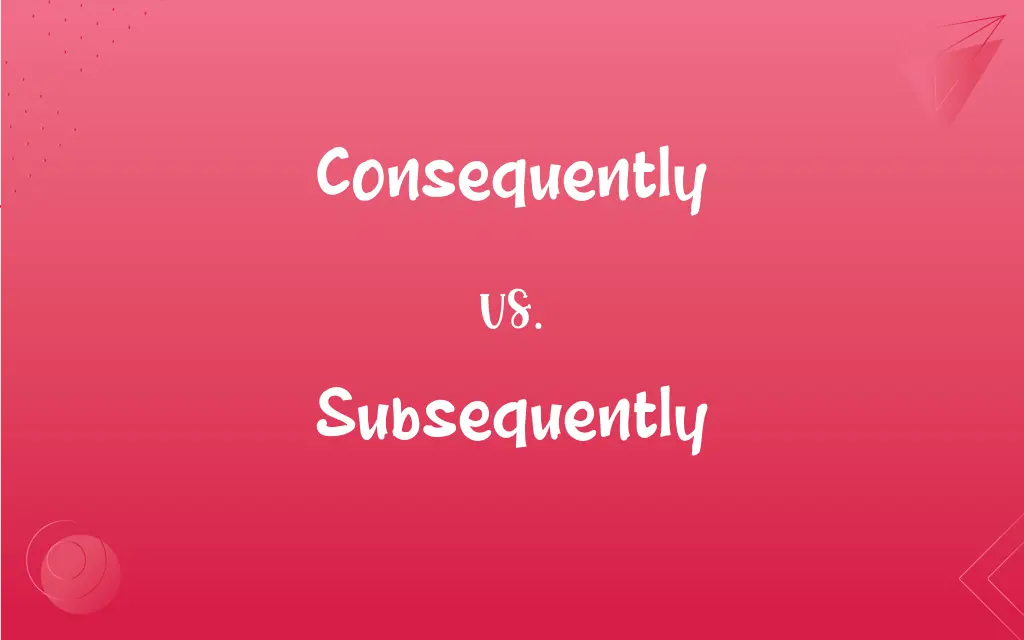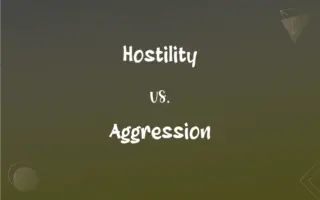Consequently vs. Subsequently: What's the Difference?
Edited by Janet White || By Harlon Moss || Updated on November 18, 2023
"Consequently" indicates a result or effect, while "subsequently" denotes a time order or sequence.

Key Differences
"Consequently" is primarily used to indicate a cause-and-effect relationship. It signals that what follows is a result or consequence of what was mentioned before. "Subsequently," on the other hand, is used to denote the order of events in terms of time, indicating that one event followed another.
While "consequently" is rooted in causality, "subsequently" revolves around chronology. For instance, saying "He didn’t study; consequently, he failed" implies a direct cause-effect relationship between not studying and failing. However, saying "He took the test; subsequently, he went home" simply states the order of events without implying any causal link.
The term "consequently" can often be replaced with synonyms like "therefore" or "as a result," which carry a similar sense of causality. In contrast, "subsequently" is akin to words like "afterward" or "later," emphasizing the sequential nature of events.
It's essential to note that while "consequently" inherently provides a reason for an outcome, "subsequently" does not. Using "consequently" implies a logical connection between statements, whereas "subsequently" merely indicates the order in which things happened.
In usage, both "consequently" and "subsequently" serve as transitional words, guiding the reader or listener through a narrative or argument. However, they play different roles: "consequently" underscores causation, while "subsequently" highlights progression.
ADVERTISEMENT
Comparison Chart
Primary Function
Indicates causality.
Denotes time order or sequence.
Synonyms
Therefore, as a result, thus.
Afterward, later, after.
Implies
A cause-and-effect relationship.
A sequence or chronological order of events.
Relationship
Logical connection between statements.
Sequential connection between events.
Usage
Transitional word emphasizing causation.
Transitional word emphasizing progression.
ADVERTISEMENT
Consequently and Subsequently Definitions
Consequently
Used to introduce a statement that explains the previous one.
It rained all day; consequently, the event was postponed.
Subsequently
Following in time or order.
The course covers basic principles in the first week and subsequently delves into more complex topics.
Consequently
As a result of a particular action or situation.
He overslept and, consequently, was late for work.
Subsequently
After a particular thing has happened; afterward.
He joined the army and was subsequently promoted.
Consequently
Leading as a result or effect.
He failed to prepare; consequently, he didn't pass.
Subsequently
In a subsequent manner; at a subsequent time.
The artist introduced his work and subsequently answered questions.
Consequently
Arising as a consequence; resultant.
Their carelessness was costly and consequently avoidable.
Subsequently
At a later or future time; eventually.
She won the competition and was subsequently interviewed on TV.
Consequently
Therefore; deduced from a given fact or premise.
The roads were icy; consequently, driving was dangerous.
Subsequently
As a later or subsequent result.
The firm lost several large contracts and subsequently went bankrupt.
Consequently
As a result; therefore.
Subsequently
Following in time or order; succeeding.
FAQs
What does "consequently" primarily indicate?
"Consequently" primarily indicates a cause-and-effect relationship.
Can "consequently" and "subsequently" be used interchangeably?
No, they serve different purposes; "consequently" implies causality, while "subsequently" indicates sequence.
What's a synonym for "consequently"?
"Therefore" and "as a result" are synonyms for "consequently."
How does "subsequently" relate to time?
"Subsequently" denotes the order of events in terms of time.
Is "consequently" used in formal writing?
Yes, "consequently" is commonly used in both formal and informal contexts.
Are there situations where "consequently" shouldn't be used?
Avoid using "consequently" if there isn't a clear cause-and-effect relationship.
How does "subsequently" differ from "simultaneously"?
"Subsequently" means "after," while "simultaneously" means "at the same time."
Can "subsequently" reference future events?
Yes, it can reference events that will happen after a given point.
Can "consequently" be used in the middle of a sentence?
Yes, "consequently" can be used as a transitional word within a sentence.
What is another word for "subsequently"?
"Afterward" or "later" can be used in place of "subsequently."
Can "subsequently" be used to denote cause and effect?
No, "subsequently" only denotes a time sequence, not causality.
Is "consequently" always followed by a negative outcome?
No, "consequently" just indicates a result, which can be positive, negative, or neutral.
Does "consequently" always begin a new sentence?
Not always, but it's commonly used to start a new sentence or clause.
Can "subsequently" be used at the start of a narrative?
Typically, "subsequently" references a preceding event, so it might not fit at the very beginning.
Is "subsequently" a formal term?
"Subsequently" is neutral and can be used in both formal and informal contexts.
Can "subsequently" be used without a previous time reference?
It's clearer to use "subsequently" when a prior event or time is mentioned.
In what contexts is "consequently" most commonly found?
"Consequently" is commonly found in arguments, explanations, and narratives to indicate results.
How does "subsequently" relate to past events?
"Subsequently" indicates events that occurred after a referenced event or time.
How does "consequently" relate to logic?
"Consequently" implies a logical connection or result from a given premise or statement.
How do "because" and "consequently" differ?
"Because" provides a reason, while "consequently" presents the resulting outcome.
About Author
Written by
Harlon MossHarlon is a seasoned quality moderator and accomplished content writer for Difference Wiki. An alumnus of the prestigious University of California, he earned his degree in Computer Science. Leveraging his academic background, Harlon brings a meticulous and informed perspective to his work, ensuring content accuracy and excellence.
Edited by
Janet WhiteJanet White has been an esteemed writer and blogger for Difference Wiki. Holding a Master's degree in Science and Medical Journalism from the prestigious Boston University, she has consistently demonstrated her expertise and passion for her field. When she's not immersed in her work, Janet relishes her time exercising, delving into a good book, and cherishing moments with friends and family.






































































